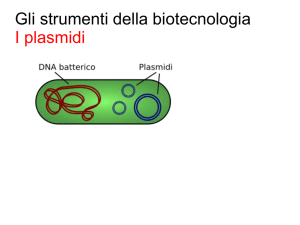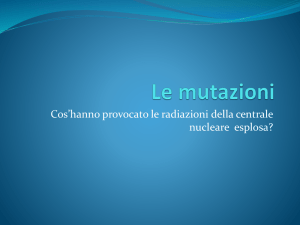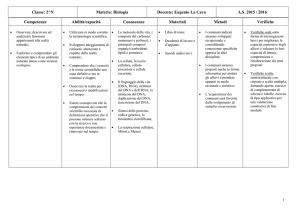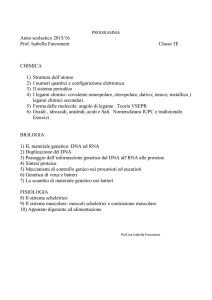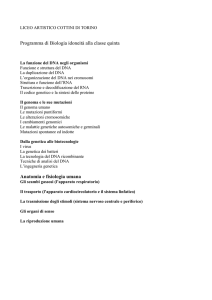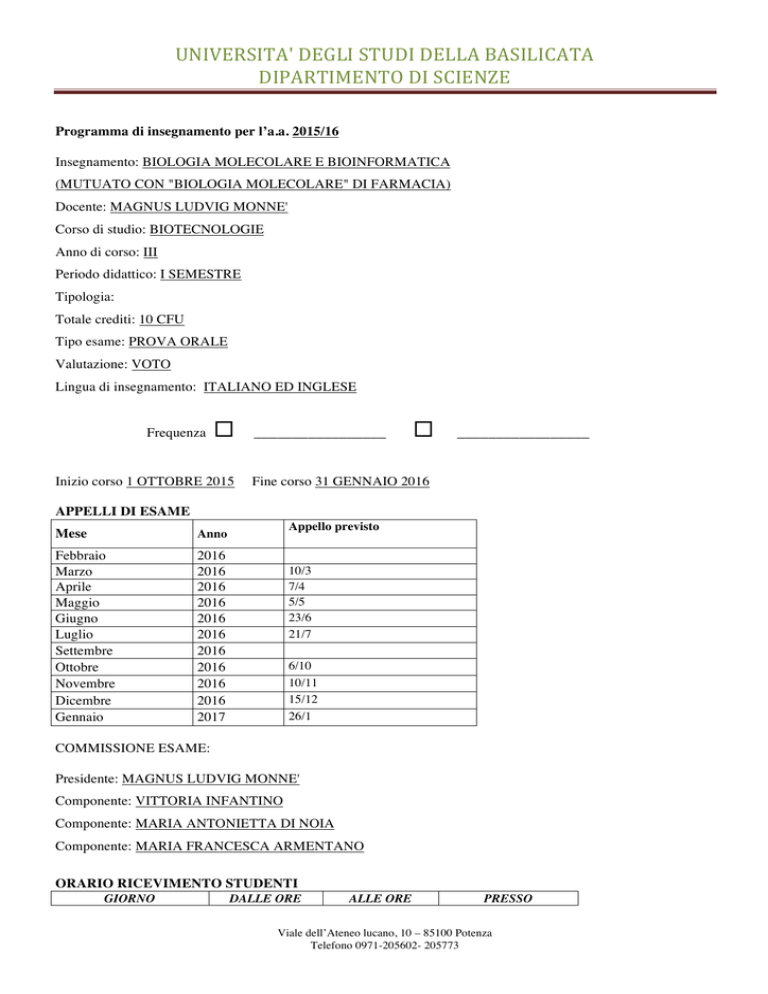
UNIVERSITA' DEGLI STUDI DELLA BASILICATA DIPARTIMENTO DI SCIENZE Programma di insegnamento per l’a.a. 2015/16
Insegnamento: BIOLOGIA MOLECOLARE E BIOINFORMATICA
(MUTUATO CON "BIOLOGIA MOLECOLARE" DI FARMACIA)
Docente: MAGNUS LUDVIG MONNE'
Corso di studio: BIOTECNOLOGIE
Anno di corso: III
Periodo didattico: I SEMESTRE
Tipologia:
Totale crediti: 10 CFU
Tipo esame: PROVA ORALE
Valutazione: VOTO
Lingua di insegnamento: ITALIANO ED INGLESE
Frequenza
!
Inizio corso 1 OTTOBRE 2015
_________________
!
_________________
Fine corso 31 GENNAIO 2016
APPELLI DI ESAME
Mese
Anno
Febbraio
Marzo
Aprile
Maggio
Giugno
Luglio
Settembre
Ottobre
Novembre
Dicembre
Gennaio
2016
2016
2016
2016
2016
2016
2016
2016
2016
2016
2017
Appello previsto
10/3
7/4
5/5
23/6
21/7
6/10
10/11
15/12
26/1
COMMISSIONE ESAME:
Presidente: MAGNUS LUDVIG MONNE'
Componente: VITTORIA INFANTINO
Componente: MARIA ANTONIETTA DI NOIA
Componente: MARIA FRANCESCA ARMENTANO
ORARIO RICEVIMENTO STUDENTI
GIORNO
DALLE ORE
ALLE ORE
PRESSO
Viale dell’Ateneo lucano, 10 – 85100 Potenza
Telefono 0971-205602- 205773
UNIVERSITA' DEGLI STUDI DELLA BASILICATA DIPARTIMENTO DI SCIENZE LUNEDI’
MARTEDI’
MERCOLEDI’
GIOVEDI’
17.00
18.00
NELLO STUDIO
DEL DOCENTE
VENERDI’
Eventuali prerequisiti:
PROPEDEUTICO: GENETICA GENERALE ED APPLICATA.
Obiettivi formativi:
Esploreremo i processi fondamentali della Biologia Molecolare nel flusso di informazione dal DNA ad RNA e
proteine e la loro regolazione e identificheremo bersagli per antibiotici e farmaci. Inoltre, tratteremo di meccanismi
che assicurano l'integrità del genoma e di controllo epigenetico dell'espressione genica. I sistemi di Biologia
Molecolare sono utilizzati e manipolati nelle tecnologie di clonaggio molecolare per studiare la funzione dei geni e
delle proteine in condizioni normali e patologiche. Infine, descriveremo lo sviluppo delle nuove strategie
terapeutiche e i sistemi diagnostici emersi dalla ricerca di base ed applicata in Biologia Molecolare.
Programma del corso
I. Il flusso di informazione.
Il dogma centrale, struttura e funzione del DNA, dell'RNA e delle proteine. Topologia del DNA e le topoisomerasi.
Geni, genomi, nucleosomi e cromosomi.
La replicazione del DNA: le DNA polimerasi, altri enzimi della forca replicativa, regolazione dell'inizio, la
telomerasi.
Mutazioni e danni al DNA, sistemi di riparazione.
La ricombinazione omologa e trasposoni.
La trascrizione: le RNA polimerasi, il promotore, i fattori generali della trascrizione.
La maturazione dell'mRNA: capuccio 5', poliadenilazione 3', lo splicing, lo spliceosoma, lo splicing alternativo,
l'RNA editing.
La traduzione: mRNA, tRNA, amminoacil-tRNA sintetasi, i ribosomi.
La regolazione trascrizionale e traduzionale; sequenze e fattori regolatrici della trascrizione, l'eredità
epigenetica, rimodellamento della cromatina.
I riboswitch, miRNA, siRNA.
II. Metodi.
Clonaggio: PCR, elettroforesi su gel, endonucleasi, DNA ligasi, vettori, trasformazione delle cellule,
sequenziamento del DNA.
Produzione di proteine ricombinanti.
Analizzare macromolecole: tipizzazione del DNA, Southern blot, Northern blot, DNA microarray, geni reporter.
Bioinformatica: banche dati, allineamento ed analisi delle sequenze e delle strutture.
III. I prodotti biotecnologici nell'industria farmaceutica.
Funzione, struttura e produzione delle proteine ricombinanti farmaceutiche, vaccini ricombinanti, anticorpi
monoclonali ricombinante, ingegneria metabolica, animali transgenici, terapia genica.
UNIVERSITA' DEGLI STUDI DELLA BASILICATA DIPARTIMENTO DI SCIENZE Metodi didattici
lezione frontale/laboratorio
Modalità di verifica dell’apprendimento
esame finale
Testi di Riferimento
•
James Watson, Tania Baker, Stephen Bell, Alexander Gann, Michael Levine e Richard Losick. Biologia
molecolare del gene. Sesta o settima edizione, Zanichelli.
•
Maria Luisa Calabrò: Compendio di Biotecnologie Farmaceutiche. EdiSES 2008.
Appunti delle lezioni.
Altre informazioni:
___________________________________________________________________________________
UNIVERSITA' DEGLI STUDI DELLA BASILICATA DIPARTIMENTO DI SCIENZE Syllabus a.a. 2015/16
Course: MOLECULAR BIOLOGY AND BIOINFORMATICS
Professor: MAGNUS LUDVIG MONNE'
Course of studies: BIOTECHNOLOGY
Academic Year: III
ECTS: 10
Teaching Methods: LECTURES AND LAB. ACTIVITIES
Evaluation Method: ORAL EXAM
Evaluation: score on 30 points
Semester: I
Language: ITALIAN and ENGLISH
Course beginning on 1 OCTOBER 2015 ending on 31 JANUARY 2016
CALLS FOR EXAMINATION
Month
Year
February
2016
March
2016
April
2016
May
2016
June
2016
July
2016
September
2016
October
2016
November
2016
December
2016
Juanary
2017
EXAMINATION PANEL:
Expected call
10/3
7/4
5/5
23/6
21/7
6/10
10/11
15/12
26/1
President: MAGNUS LUDVIG MONNE'
Member: VITTORIA INFANTINO
Member: MARIA ANTONIETTA DI NOIA
Member: MARIA FRANCESCA ARMENTANO
Previous requirements:
COMPULSORY: GENETICA GENERALE ED APPLICATA.
Learning Outcomes:
UNIVERSITA' DEGLI STUDI DELLA BASILICATA DIPARTIMENTO DI SCIENZE In this course, we will explore the fundamental processes of Molecular Biology in the flow of information from
DNA to RNA and protein and their regulation as well as identify targets for antibiotics and drugs. In addition we
will consider the mechanisms that ensure the integrity of the genome and epigenetic control of gene expression.
These systems of Molecular Biology are used and manipulated in molecular cloning techniques for the study of
proteins and genes in healthy and pathogenic conditions. Towards the end we describe the development of new
therapeutic strategies and diagnostic systems that have emerged from basic and applied research in Molecular
Biology.
___________________________________________________________________________________
Syllabus:
I. The flow of information.
The central dogma, structure and function of DNA, RNA and proteins. Topology of DNA and topoisomerases.
Genes, genomes, nucleosomes and chromosomes.
DNA replication: DNA polymerases, other enzymes at the replication fork, regulation of initiation, telomerase.
Mutations and damage of DNA, systems for repair.
Homologous recombination and transposons.
Transcription: RNA polymerases, promotors, general transcription factors.
Maturation of RNA: 5'-capping, 3'-polyadenylation, splicing, the spliceosome, alternative splicing, RNA editing.
Translation: mRNA, tRNA, amminoacyl-tRNA synthase, ribosomes.
Transcriptional and translational regulation: regulatory sequences and factors in trascription, epigenetic
inheritance, chromatin remodelling.
Riboswitches, miRNA, siRNA.
II. Methods.
Cloning: PCR, gel electrophoresis, endonucleases, DNA ligase, vectors, transformation of cells, DNA sequencing.
Production of recombinant proteins.
Analyses of macromolecules: genotyping, Southern Blot, Northern blot, DNA microarray, gene reporters.
Bioinformatics: data banks, alignment and analysis of sequences and structures.
III. Biotechnologic products in the pharmaceutical industry.
Function, structure and recombinant production of pharmaceutical recombinant proteins, recombinant vaccines,
recombinant monoclonal antibodies, metabolic engineering, transgenic animals, gene therapy.
__________________________________________________________________________________
Suggested textbooks:
•
James Watson, Tania Baker, Stephen Bell, Alexander Gann, Michael Levine and Richard Losick.
Molecular Biology of the Gene. Sixth or seventh edition, Zanichelli.
•
Maria Luisa Calabrò: Compendio di Biotecnologie Farmaceutiche. EdiSES 2008.
Notes from the lectures.
__________________________________________________________________________________
Further information:
___________________________________________________________________________________
UNIVERSITA' DEGLI STUDI DELLA BASILICATA DIPARTIMENTO DI SCIENZE

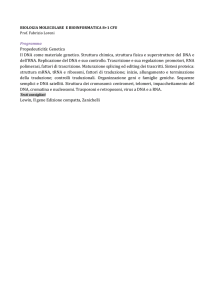
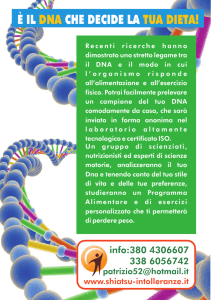
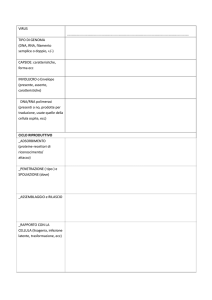
![mutazioni genetiche [al DNA] effetti evolutivi [fetali] effetti tardivi](http://s1.studylibit.com/store/data/004205334_1-d8ada56ee9f5184276979f04a9a248a9-300x300.png)
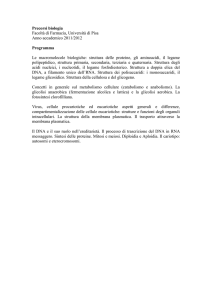
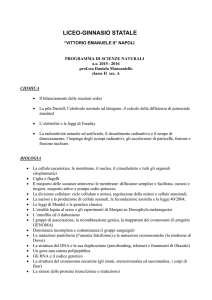
![ESTRAZIONE DNA DI BANANA [modalità compatibilità]](http://s1.studylibit.com/store/data/004790261_1-44f24ac2746d75210371d06017fe0828-300x300.png)
